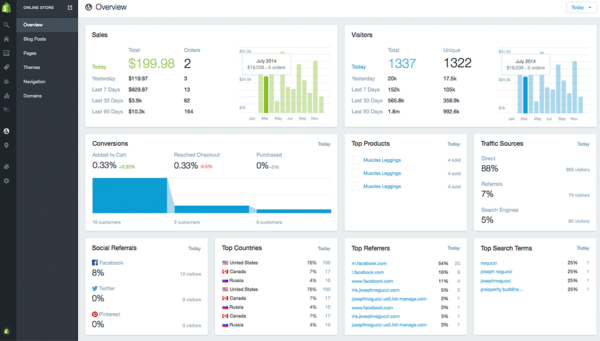
SEO Strategy for Shopify – Get Tips Here
Search engine optimization (SEO) is a critical aspect of any online store’s success, and it’s especially important for those using the popular e-commerce platform Shopify.
By optimizing your store for search engines, you can increase your visibility, drive more traffic to your site, and ultimately improve your sales. In this article, we’ll explore the key factors that go into SEO for Shopify and provide some tips and best practices for optimizing your store.
First, let’s start by defining SEO. Essentially, SEO is the process of improving the ranking of your website on search engines like Google, Bing, and Yahoo.
When someone searches for a particular term or phrase, search engines use algorithms to determine the relevance and quality of the websites that appear in the search results.
By optimizing your website for search engines, you can improve your ranking and increase the chances that your website will appear near the top of the search results.
Related >> 3 steps to analyzing your competitor’s SEO

How do you go about optimizing your Shopify store for search engines?
Here are some key factors to consider:
-
Keywords: Keywords are the terms and phrases that people use when searching for products or services online. By including relevant keywords in your website’s content and meta tags, you can improve your search engine ranking and attract more targeted traffic. To find the right keywords, you can use tools like Google’s Keyword Planner or Ahrefs to see what people are searching for in your industry.
-
Content: Content is a crucial element of SEO, as search engines use the content on your website to determine its relevance and quality. When creating content for your Shopify store, be sure to include relevant keywords, but also make sure that the content is useful and informative for your visitors.
-
Meta tags: Meta tags are tags that you can use to provide information about your website to search engines. The two most important meta tags for SEO are the title tag and the meta description. The title tag appears in the search results and should include your primary keyword as well as a brief description of your page. The meta description appears below the title tag in the search results and should provide a more detailed description of your page. By optimizing your title tags and meta descriptions, you can improve your search engine ranking and increase the chances that people will click through to your website.
-
URLs: The URL of your website should be descriptive and include relevant keywords. For example, if you’re selling shoes, a good URL might be “www.yourstore.com/shoes“.
-
Images: Images can also be optimized for search engines by including relevant keywords in the file name and alt text. Alt text is a text description of an image that appears when the image can’t be displayed, and it’s important for SEO because search engines can’t see images the way humans can.
-
Site speed: Site speed is another important factor for SEO, as search engines want to provide their users with the fastest and most efficient experience possible. To improve your site speed, you can optimize your images, minimize the use of plugins, and use a content delivery network (CDN).
-
Mobile optimization: With more and more people accessing the internet on their smartphones, it’s important to make sure that your website is mobile-friendly. Shopify provides a number of tools and resources to help you optimize your store for mobile, including a mobile optimization guide and the option to enable a mobile-specific theme.
-
Internal linking: Internal linking is the practice of linking to other pages on your website from within your content. This helps search engines understand the structure and hierarchy of your website, and it can also improve the user experience by making it easier for visitors to navigate your site.
Related > > 10 Benefits of Using GA4

Shopify vs WordPress
It’s important to note that both Shopify and WordPress are popular and powerful tools for building an online store or website. Ultimately, the right platform for you will depend on your specific needs and goals. That being said, here are a few reasons why Shopify may be a better choice for some businesses:
-
Ease of use: Shopify is specifically designed for e-commerce, so it’s generally easier to set up and use than WordPress, which is a more general-purpose platform. Shopify offers a variety of templates and themes, and it has a user-friendly interface that makes it easy to add products, process orders, and manage your store.
-
Security: Shopify takes security seriously and offers a number of features to protect your store and your customers’ information. For example, Shopify uses secure servers, SSL certificates, and fraud analysis tools to ensure that your store is safe and secure.
-
Payment processing: Shopify integrates with a variety of payment gateways, making it easy to accept credit card payments from customers around the world. It also offers tools for managing abandoned carts and generating invoices.
-
Marketing and SEO: Shopify provides a number of marketing and SEO tools to help you reach more customers and improve your search engine ranking. For example, it offers email marketing, social media integration, and Google Analytics integration.
-
Customer support: Shopify has a strong customer support team that is available 24/7 to help you with any issues or questions you may have. This can be especially useful for new store owners who may not have a lot of experience with e-commerce.
Shopify is a well-rounded platform that offers a variety of features and tools to help you build and manage a successful online store. While WordPress may be a good choice for some businesses, those looking for a more streamlined and focused e-commerce solution may find that Shopify is the better option.
Related > > What is a backlink and how to get more?
